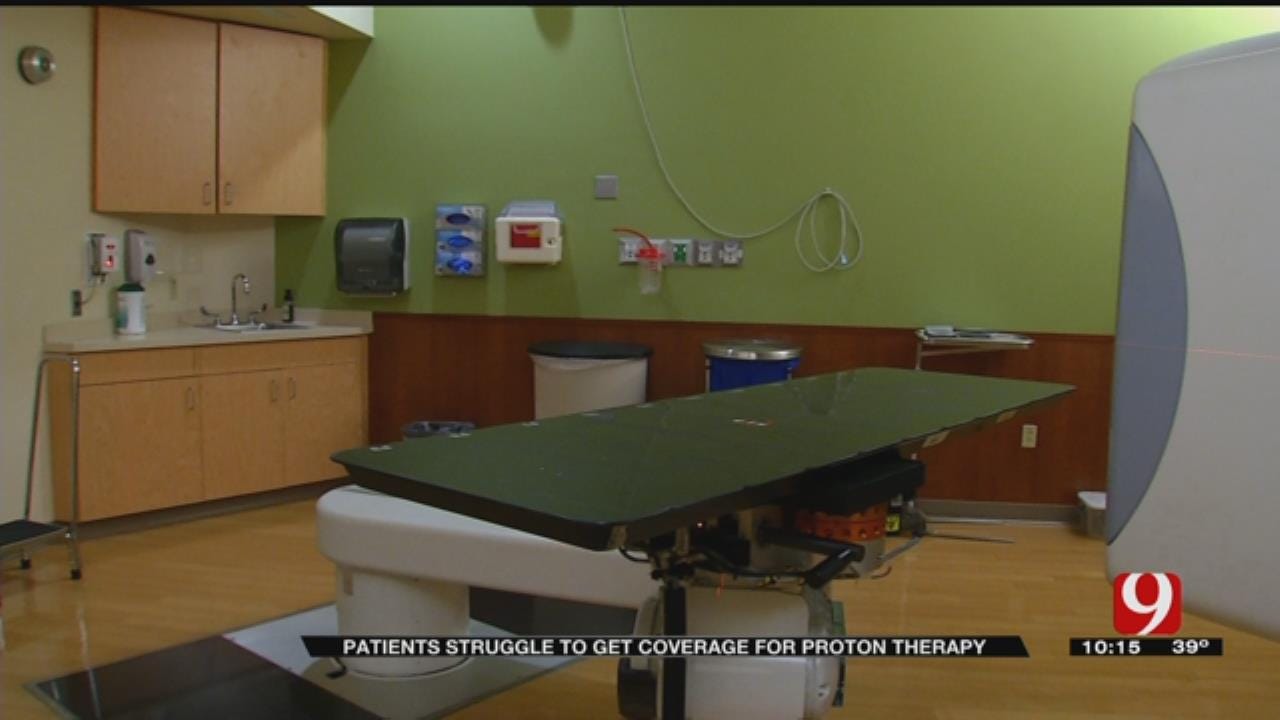9 Investigates: Patients Struggle To Get Coverage For Proton Therapy
In a state not known to be a leader in medical care, Oklahomans might consider themselves fortunate to have two centers that offer proton beam therapy, a still relatively rare cancer treatment that is generally believed to be safer.Friday, December 14th 2018, 11:00 pm
In a state not known to be a leader in medical care, Oklahomans might consider themselves fortunate to have two centers that offer proton beam therapy, a still relatively rare cancer treatment that is generally believed to be safer, and sometimes more effective than traditional radiation therapy.
But ProCure Proton Therapy Center (ProCure), one of the state's two centers (both are located in Oklahoma City), just declared bankruptcy, at least in part because insurance companies now decline coverage of proton therapy more often than they approve it.
Many local cancer patients have learned this firsthand.
During a recent visit at ProCure, Hauli Gray's oncologist told her to be mindful of long-term pain in her chest. Gray can think 'long-term' these days, which was not a given just over a year ago when she learned that, at age 33, she had breast cancer.
"It was so shocking that I didn't even have time to..." Gray fumbled for the right words, "it wasn't reality."
But reality set in. Gray had her left breast removed and underwent chemotherapy. And then came another unhappy reality: her insurance, Blue Cross-Blue Shield, declined to cover the radiation treatment that her doctor recommended, proton beam therapy.
"I was very shocked-very, very shocked," Gray told us. "I didn't know what to think or what was going to happen after that."
Her oncologist, Dr. Gary Larsen, wasn't so shocked.
"Unfortunately, we just expect for patients to be denied the first time around," Dr, Larsen said, in an interview.
Larsen says, while it's no longer shocking, it is still very frustrating, especially in a case like Gray's, where, he says, the heart sits very close to lymph nodes that have to be treated.
"So I knew that proton therapy was the only way we could irradiate those without giving an excess dose to her heart," Dr. Larsen explained.
He says proton therapy was going to be safer for her heart, and also reduce her risk of developing radiation-induced cancer later in life.
Still, Blue Cross-Blue Shield said no.
"Things have gotten worse, rather than better," said ProCure President Andrew Knizley, in an interview last summer, "with respect to insurance companies' coverage of proton therapy."
Knizley acknowledges that one reason coverage gets denied is that proton therapy is more expensive than traditional radiation, but he says insurance companies are partly to blame for that.
"Instead of negotiating in good faith to come up with the right price for proton therapy," Knizley said, "insurance companies just chose to deny."
According to Industry sources, 63 percent of requests for coverage of proton therapy, among patients who are not on Medicare, are initially denied. And, in a report published in May 2018, the Alliance for Proton Therapy Access called on state insurance commissioners to "hold insurers accountable for providing fair, timely and transparent access to cancer treatment."
Interestingly, Medicare routinely approves coverage of Proton Therapy.
"I think that's a decision that Medicare has made," said Mike Rhoads, Deputy Insurance Commissioner, "and, frankly, I think it complicates everything."
Deputy Commissioner Rhoads says he's heard the complaint that private insurers in Oklahoma - Blue Cross-Blue Shield, primarily are indiscriminately denying coverage of proton therapy, and says the department has investigated.
"Frankly, we find no evidence of any kind of violation," Rhoads stated.
Rhoads acknowledges that many initial requests for coverage are being denied, but says that's because insurance companies need more results from clinical trials to prove proton therapy is cost-effective.
With only about 30 proton therapy centers currently operating across the country, News 9's Dr. Lacy Anderson says, that's a catch - 22.
"You have to have a large enough patient population to do the studies," Dr. Anderson explained, "and because there are so few proton therapy centers across the country and because not every patient is approved for it, it's gonna take a little bit of time to complete those studies."
In the meantime, patients can appeal denials, first internally, and then, if denied again, externally. But appeals often take several weeks, and many cancer patients are unwilling to wait and thus opt to go ahead with traditional radiation.
From January 1, 2017 through June 30, 2018, 31 cancer patients in Oklahoma appealed their proton therapy denials to a third-party review; five, or 15 percent, were overturned.
"Fifteen percent overturn of those denials," commented Deputy Rhoads, "is typically, about what we see across all these external review platforms."
Hauli Gray's denial was not one of those overturned.
"I told my husband, and I told others around me," Gray recalled, "if it was meant for me to have proton therapy, then it'll be."
Apparently, it was meant to be. Thanks to Gray's Native American heritage, the Indian Health Service stepped up and covered her treatment.
Gray is very grateful and is on the road to a full recover. But says she and others fighting cancer shouldn't also have to fight their insurance companies to get treatment that their doctors recommend.
"I'm hoping and praying that one day...they can say, 'you need protons' and that's where they'll send you," Gray said. "That's what I'm hoping and praying for is a change. not just for me but for everybody."
More Like This
December 14th, 2018
December 5th, 2019
October 17th, 2019
August 29th, 2019
Top Headlines
April 11th, 2025













